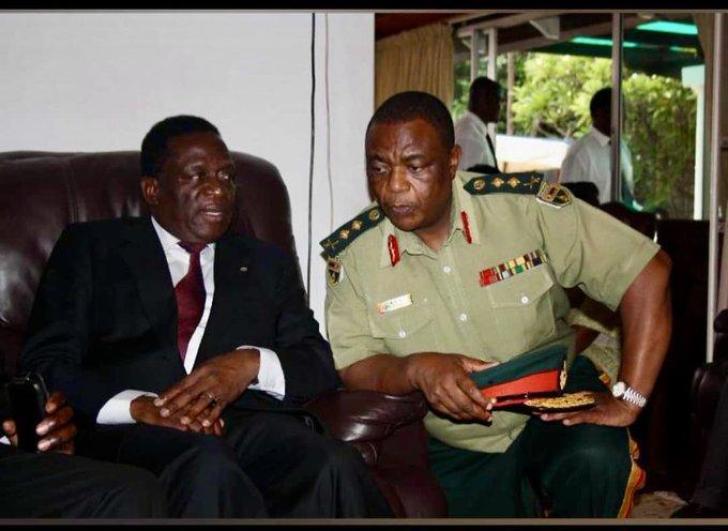Opinion / Columnist
Mnangagwa's betrayal of General Chiwenga
07 Oct 2025 at 16:21hrs |
0 Views

President Mnangagwa's betrayal of General Chiwenga Signals a Dangerous Drift in Zimbabwe's Power Politics. In the corridors of Zimbabwean power, loyalty is often a temporary virtue rewarded when convenient, discarded when threatening. The political fallout between President Emmerson Mnangagwa and Vice President Constantino Chiwenga is not merely a personal rupture; it is a seismic shift that exposes the fragility of Zimbabwe's post-coup political architecture. As a political analyst, I compelled to call this what it is a betrayal. And not just of General Chiwenga but of the Gentleman agreement or promise made to Zimbabweans in 2017, when the Military-assisted transition was sold as a new dawn.
General Chiwenga was instrumental in President Mnangagwa's rise. His command of the armed forces and his orchestration of Former President Mugabe's removal were decisive. At the time, the alliance between soldier and politician appeared unbreakable. But Mnangagwa's subsequent actions have rewritten that narrative. Reports of President Mnangagwa grooming Criminal Tagwirei as a potential successor outside the agreed succession plan, empowering youth leaders to undermine General Chiwenga, and strategically isolating him from key decision-making circles paint a clear picture the president no longer sees his vice as an ally, but as a threat.
This is not succession planning it is succession sabotage.
President Mnangagwa's political instincts are sharp. He understands that power in Zimbabwe is not inherited it is defended. By neutralizing General Chiwenga, he removes the last major figure with both military clout and political legitimacy to challenge his rule. But in doing so, he risks destabilizing the very foundation of ZANU-PF's internal balance. The military, long a silent stakeholder in Zimbabwean governance, may not take kindly to the sidelining of one of its own. And the public already weary of economic hardship and political stagnation may see this as yet another betrayal of the promises made in the post-Mugabe era. Zimbabwe's governance cannot afford to be held hostage by elite rivalries. The Mnangagwa-Chiwenga fallout is emblematic of a broader dysfunction a political culture where personal ambition trumps national interest, and where loyalty is transactional, not principled.
The consequences are real. Policy paralysis, institutional erosion, and public disillusionment are the inevitable outcomes of a leadership obsessed with self-preservation.
This analysis is not a defense of General Chiwenga it is a defense of accountability. Zimbabweans deserve leaders who serve, not scheme. The betrayal of General Chiwenga is a warning when loyalty is punished and service is politicized, no one is safe not even the kingmakers. It is time for Zimbabwe to rise above the politics of betrayal. Public office must be reclaimed as a platform for service, not a battleground for succession. The future of this nation depends on it.
General Chiwenga was instrumental in President Mnangagwa's rise. His command of the armed forces and his orchestration of Former President Mugabe's removal were decisive. At the time, the alliance between soldier and politician appeared unbreakable. But Mnangagwa's subsequent actions have rewritten that narrative. Reports of President Mnangagwa grooming Criminal Tagwirei as a potential successor outside the agreed succession plan, empowering youth leaders to undermine General Chiwenga, and strategically isolating him from key decision-making circles paint a clear picture the president no longer sees his vice as an ally, but as a threat.
This is not succession planning it is succession sabotage.
President Mnangagwa's political instincts are sharp. He understands that power in Zimbabwe is not inherited it is defended. By neutralizing General Chiwenga, he removes the last major figure with both military clout and political legitimacy to challenge his rule. But in doing so, he risks destabilizing the very foundation of ZANU-PF's internal balance. The military, long a silent stakeholder in Zimbabwean governance, may not take kindly to the sidelining of one of its own. And the public already weary of economic hardship and political stagnation may see this as yet another betrayal of the promises made in the post-Mugabe era. Zimbabwe's governance cannot afford to be held hostage by elite rivalries. The Mnangagwa-Chiwenga fallout is emblematic of a broader dysfunction a political culture where personal ambition trumps national interest, and where loyalty is transactional, not principled.
The consequences are real. Policy paralysis, institutional erosion, and public disillusionment are the inevitable outcomes of a leadership obsessed with self-preservation.
This analysis is not a defense of General Chiwenga it is a defense of accountability. Zimbabweans deserve leaders who serve, not scheme. The betrayal of General Chiwenga is a warning when loyalty is punished and service is politicized, no one is safe not even the kingmakers. It is time for Zimbabwe to rise above the politics of betrayal. Public office must be reclaimed as a platform for service, not a battleground for succession. The future of this nation depends on it.
Source - x
All articles and letters published on Bulawayo24 have been independently written by members of Bulawayo24's community. The views of users published on Bulawayo24 are therefore their own and do not necessarily represent the views of Bulawayo24. Bulawayo24 editors also reserve the right to edit or delete any and all comments received.
Join the discussion
Loading comments…
























